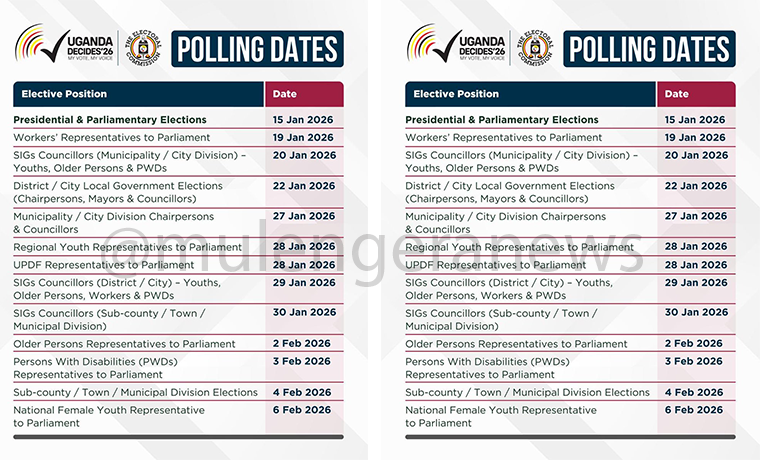By Our Reporters
In her public notice published on 24th March 2018, the Commissioner General of URA Dorris Akol clarified on educational materials that do and don’t qualify for tax exemption under the VAT Act.
However it’s the smallest component in her half page notice that has since caused discomfort and protestations from Uganda Manufacturers Association (UMA) many of whose members are involved in manufacturing educational materials for sale to schools, pupils and their parents. It reads as follows: “For avoidance of doubt Educational Materials DO NOT include counter books (Quired or NOT), note books, ruled papers or any other papering form not mentioned above or other items not listed above.” Akol says her clarification is derived or based on the provisions of the law contained in Section 24 of the VAT Act and paragraph 4 of the 3rd schedule and paragraph 2 of the 2nd schedule to the VAT Act. Upon speaking to UMA’s head of policy Micheal Oketcho, who voiced strong objections to Akol’s notice, we rang URA Ag Assistant Commissioner Public & Corporate Affairs Ian Rumanyika who strongly defended his boss saying everything that was stated in that public notice was based on the provisions of the law and nothing else. “I’m fully aware of that statement and all its contents are based on what the law says and empowers us to do,” Rumanyika said expressing readiness to sensitize any UMA members who might be doubtful regarding the CG’s powers to communicate what she disclosed in that public notice. UMA’s Oketcho says that URA’s mandate is to implement policy and nor formulating policy for the country concerning tax matters. He insists URA must follow the policy direction and implement the same amongst the numerous government MDAs and private sector organizations as guided by its mother ministry of finance. The UMA bosses insist that not taxing all manner of educational materials isn’t only an obligation under the Florence International Convention (which guarantees access to education by all including the world’s poorest people) but it’s also something well elaborated in President Museveni’s 2016-2021 election manifesto. “The policy of government and development partners is very clear and well-articulated. It requires that taxation should be used to enhance mass access to education in Uganda as opposed to constraining access. That is the bigger picture of things which the Finance Ministry has several times guided URA in writing. It’s a global best practice principle that anything that goes into education sector isn’t subject to VAT and import tax duty,” said an influential UMA executive member. “All these problems and the resultant anxiety which investors see as amounting to uncertainty would have been avoided if URA would be consultative before acting. What stops them from calling a meeting to get our views and in the end there is harmonization? Anxiety and uncertainty of policy isn’t good for the economy because just see we now clearly have two policy positions on the same matter in just 6 months-pone from the Finance Ministry and another from URA. It makes Uganda to be a country with a very unpredictable investment climate which no investor wants,” said the UMA member whose views were corroborated by Oketcho as representative of what the UMA Executive Director Mubarak Nkutu thinks on the matter. We tried calling Nkutu but our calls went unanswered and this prompted us to ring Oketcho. This is how Oketcho explained: “The counter books mentioned in that public notice are actually what most students use from P5 to University and its counterproductive and runs counter to the NRM manifesto of mass education because once we pay VAT on them it means the price per book will rise and thereby making education unaffordable. Such taxes hurt the manufacturing sector and hampers our ability to support the education sector by manufacturing affordable educational materials like those counter books.” Oketcho added that: “When you look at the PLE results of last year you find that of the 1.9m pupils who started P1, only 670,000 completed P7 and sat PLE. The other 1.2m pupils was lost; they didn’t complete and it’s mostly because of the cost associated with education. UPE is there and there is no need to pay school fees but parents must buy educational materials which many can’t afford hence the high dropout rate. This is why we are opposing such policies similar to what is articulated in the URA notice because it can only make the situation worse.”





FINANCE MIN SPEAKS OUT;
The Finance Ministry policy guidelines the UMA officials are referring to are articulated in a number of letters the finance ministry has written on the matter. These include Investments (UMA) minister Evelyn Anite’s 3rd August 2017 letter addressed to Akol. In that letter Anite begs that URA “maintains the status quo in respect to the VAT treatment of the various types of exercise books produced in Uganda.” Her letter shows possibility that the Finance Ministry is aware of the thin line existing between what is and is not exempted when it comes to taxing educational materials. She says there has been a problem of “misclassification of educational supplies in respect to VAT.” She says the same was brought to the attention of the President and it was comprehensively discussed in State House Entebbe during the Tuesday 2nd August 2017 meeting with the President. “His excellence therefore directed that there should be no VAT imposed on exercise books whatever the material,” Anite writes in a one page letter copied to a number of officials including Matia Kasaija, PSST Keith Muhakanizi, PPS Molly Kamukama and the PS Education Ministry Alex Kakooza. On 7th June 2017, Kakooza had also written to PPST Keith Muhakanizi raising the concerns UMA had regarding URA’s insistence to tax some of the educational materials. Kakooza says URA’s insistence to tax some of these educational materials will hamper his ministry’s efforts to improve learners’ retention while diminishing learner dropout rates. Alex Kakooza quoted the 30th November 2005 letter the Finance Ministry wrote to the education ministry listing all the educational materials that shouldn’t be taxed in a manner that is agreeable to UMA. The November 2005 letter was written by Moses Kaggwa who currently is the Director of Economic Affairs the very capacity in which he directly supervises URA having replaced Lawrence Kiiza. Kaggwa’s letter was titled “VAT POLICY ON EDUCATIONAL AND EXAMINATION MATERIALS” and it was copied to CG URA then Allen Kagina, URA Commissioner Domestic Taxes, the ED UMA and ED UIA. It lists 12 educational items that aren’t supposed to be subjected to any VAT tax payment and Ruled Papers, which UMA says URA shouldn’t be taxing, is number 8 on that list of 12 exempted items. Kaggwa’s letter was addressed to PS Education who was then FX Lubanga. There is also the PSST Keith Muhakanizi 23rd August 2017 letter addressed to the Education Minister Janet Kataha Museveni conveying UMA’s concerns regarding the VAT tax policy on educational materials. Muhakanizi refers to Evelyn Anite’s letter informing Kakooza and Janet Kataha that it’s the clearest guidance his ministry has ever given so far taken restraining URA on the matter of VAT imposition on educational materials. For comments, call/text/whatsapp us on 0703164755!
































